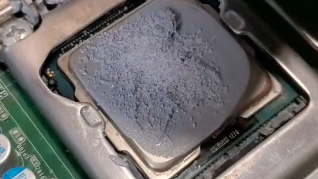CPU cooling company 'definitely doesn't recommend' adding salt to your thermal paste
This may be the only case where adding a pinch of salt isn’t recommended.

Hardware enthusiasts are always looking for ways to bring down temperatures to raise the performance of their processors. Some would even go to extreme lengths, such as grinding down the heat spreader on a Ryzen 7000 CPU on a belt sander. I'm serious.
TikToker, Mryeester, when he's not doing weird thermal paste designs, wanted to see if adding salt to thermal paste would be the secret ingredient to unlocking supercooling. Spoilers: It was not.
His theory is that since iodized salt's thermal conductivity is higher than some thermal pastes, mixing the two would produce a miracle gloop with better heat transfer. Though Mryeester points out in his video, testing showed that temperatures spiked at 20 degrees above normal. The issue is that the salt rocks are thick, which creates a small gap between the CPU and the cooler, where you ideally want as much contact as possible.
For more insight on the experiment from the people that know cooling best, I reached out to Noctua. A hardware manufacturer that knows a thing or two about CPU cooling; it explained to me why introducing salt (or any other foreign substance while we are at it) into your thermal paste is such a bad idea.
After initially wondering if I were serious, which is a reasonable response since my day-to-day consists of asking hardware professionals if doing a ridiculous PC mod I saw online is a good idea or not, the company said that it "definitely doesn't recommend doing anything like that," then gave several reasons as to why salt should not be mixed with your thermal paste.
"The thermal conductivity of salt is much lower than that of traditional filler materials such as aluminum oxide or other metal oxides," a rep tells me. "Also, salt particles keep the cooler from making good contact with the CPU, so that thermal performance will be poor due to poor contact. Last but not least, there's a high risk of corrosion issues."
A part of me was hoping that salt would have been a cheap and easy way to improve CPU cooling, so you can imagine my disappointment that it wasn't. I'm glad there are still adventurous hardware people willing to risk their precious PC gaming components in these wild experiments, anyways, so I don't have to.
Keep up to date with the most important stories and the best deals, as picked by the PC Gamer team.
The best CPU coolers in 2022
Wet or dry, the best CPU coolers around
Best AIO coolers for CPUs
All-in-one, and one for all... components
Best CPU air coolers
CPU coolers with or without fans that go brrrr

Jorge is a hardware writer from the enchanted lands of New Jersey. When he's not filling the office with the smell of Pop-Tarts, he's reviewing all sorts of gaming hardware, from laptops with the latest mobile GPUs to gaming chairs with built-in back massagers. He's been covering games and tech for over ten years and has written for Dualshockers, WCCFtech, Tom's Guide, and a bunch of other places on the world wide web.


